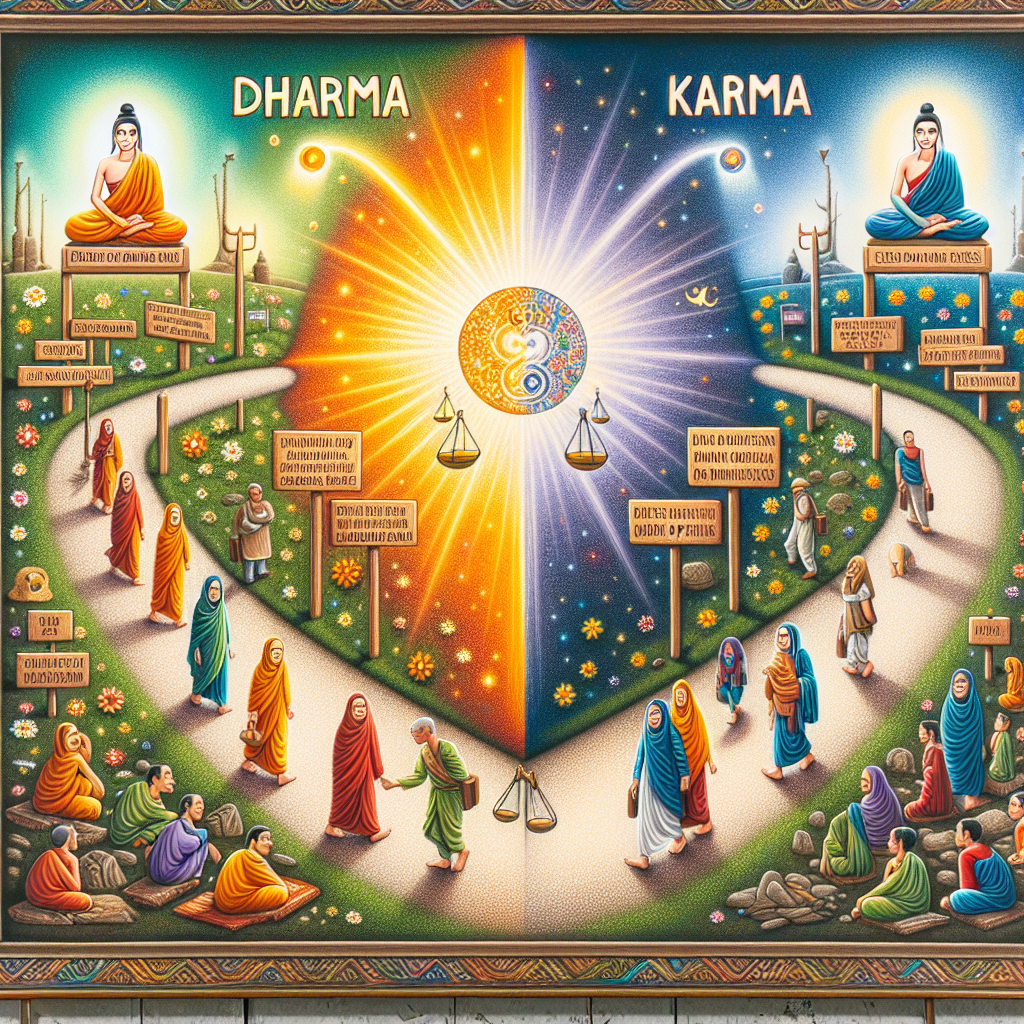Dharma is a fundamental concept in Indian philosophy and spirituality, playing a crucial role in Hinduism, Buddhism, Jainism, and Sikhism. While the word “dharma” has a range of interpretations, at its core, it signifies the moral order of the universe, and the ethical obligations and duties of individuals. In this article, we will delve into the meaning of dharma, its significance in daily life, and how applying dharma can help us lead a more fulfilling and right life.
What is Dharma?
Dharma can be translated in various ways, including duty, righteousness, moral law, and ethical conduct. It represents a system of laws or moral codes that governs individual behavior and maintains harmony in society. Dharma encourages living in accordance with one’s true nature and fulfilling one’s responsibilities while considering the greater good.
Here are some key elements that define dharma:
- Moral Duty: Dharma emphasizes the importance of fulfilling one’s duties with integrity.
- Universal Principles: While personal dharma is unique to each individual, certain universal principles of right and wrong apply to all.
- Balance and Harmony: Dharma seeks to maintain balance in personal life, society, and nature.
- Adaptability: Dharma is not rigid; it evolves with changing circumstances and contexts.
The Role of Dharma in Different Traditions
In various philosophical and religious traditions, dharma is interpreted and applied differently. Understanding these nuances can deepen our appreciation of the concept.
Dharma in Hinduism
In Hinduism, dharma is considered one of the four “Purusharthas,” or goals of a human life, alongside Artha (prosperity), Kama (pleasure), and Moksha (liberation). Each individual has a unique dharma based on their age, caste, gender, and occupation.
Hindu texts like the Bhagavad Gita emphasize that performing one’s dharma is vital for a balanced existence. Arjuna, the protagonist, struggles with his duty as a warrior, highlighting the complexities of dharma when faced with moral dilemmas.
Dharma in Buddhism
In Buddhism, dharma (often referred to as “Dhamma” in Pali) represents the teachings of the Buddha and the path to enlightenment. Establishing a proper understanding of dharma guides practitioners toward ethical living, meditation, and wisdom. The Noble Eightfold Path is a practical framework for living a life in accordance with dharma, emphasizing right view, right intention, right speech, right action, right livelihood, right effort, right mindfulness, and right concentration.
Dharma in Jainism
Jainism places significant emphasis on living in harmony with all living beings and the environment. Dharma in Jainism is closely linked to non-violence (ahimsa), truthfulness (satya), and asceticism. Adhering to dharma means practicing these virtues to achieve spiritual purity and liberation of the soul.
Dharma in Sikhism
Sikhism advocates for living a truthful life and upholding justice as part of one’s dharma. Sikhs are encouraged to engage in honest work (kirat karni), share with others (vand chakna), and maintain a connection to the divine through prayer (naam japna). The teachings of Guru Nanak emphasize the importance of morality, honesty, and compassion in living according to dharma.
Key Principles of Dharma
Understanding the principles of dharma can serve as a foundation for a meaningful life. Here are the fundamental principles to consider:
1. Duty and Responsibility
Your duty is not only to yourself but also to your community and environment. Understanding and fulfilling your responsibilities is a core tenet of dharma. This could include family obligations, work duties, and contributions to society.
2. Compassion and Non-violence
Compassion towards all living beings is integral to dharma. Practicing non-violence in thoughts, words, and actions fosters harmony within oneself and with the world.
3. Truthfulness
Truth is a guiding principle in making decisions and engaging with others. Upholding honesty encourages trust and strengthens relationships.
4. Respect for Diversity
Dharma acknowledges that individuals have diverse paths and responsibilities. Respecting different beliefs, opinions, and lifestyles is essential for coexisting peacefully.
5. Spiritual Growth
Dharma encourages individuals to pursue spiritual growth and self-improvement. This includes practices such as meditation, reflection, and seeking wisdom from sacred texts.
Practical Applications of Dharma in Daily Life
Understanding dharma is one thing, but applying it in daily life is another. Here are some practical ways to incorporate dharma into your everyday activities:
1. Self-Reflection
Take time daily for self-reflection. Ask yourself questions about your actions, intentions, and responsibilities. Are you fulfilling your duties? Are you acting in alignment with your values? Journaling can be a helpful tool for this practice.
2. Setting Intentions
Begin your day by setting an intention based on your understanding of dharma. This can be a simple reminder to act with kindness, honesty, and responsibility. Intentions can guide your actions and reactions throughout the day.
3. Practicing Mindfulness
Being present helps you make mindful decisions in line with your dharma. Mindfulness practices like meditation can cultivate awareness, allowing you to choose your responses consciously.
4. Engaging in Service
Contributing to your community is an essential part of dharma. Volunteering, helping those in need, or participating in community projects fosters a spirit of service and compassion.
5. Balancing Personal and Social Duties
Acknowledge your personal responsibilities (family, career) while considering the broader impact of your actions on society and the environment. Striving for balance is crucial in fulfilling your dharma.
6. Continuous Learning
Dharma is not a fixed concept; it evolves with experience and wisdom. Stay open to learning from different philosophies, traditions, and fellow beings. Engage in discussions, read insightful books, and attend workshops that deepen your understanding of dharma.
Challenges in Understanding and Practicing Dharma
Despite its importance, following your dharma can often be challenging. Here are some common obstacles:
1. Conflicting Duties
At times, your duties may conflict with each other. For example, you might face a situation where your work responsibilities clash with family obligations. In such cases, practicing discernment becomes essential to navigate these conflicts while maintaining integrity.
2. External Pressures
Society often imposes expectations that may make it difficult to follow your true dharma. The pressure to conform to certain norms can lead individuals to neglect their moral responsibilities in pursuit of societal approval.
3. Moral Dilemmas
Moral dilemmas challenge our understanding of right and wrong. In situations where there is no clear solution, it’s essential to reflect deeply and consult trusted sources of wisdom, such as sacred texts or spiritual mentors.
4. Reluctance to Change
Understanding one’s dharma may require significant lifestyle adjustments and a willingness to step out of your comfort zone. Resistance to change can hinder personal growth and the opportunity to live authentically.
Conclusion
Understanding and practicing dharma can greatly enhance the quality of our lives and relationships. By aligning our actions with moral principles and recognizing our duties towards others, we can work towards a more justo and harmonious society. Dharma is not just an abstract concept but a practical guide for right living that helps us navigate life’s complexities.
Ultimately, each individual has a unique dharma, shaped by their experiences, responsibilities, and choices. Embracing this journey of self-discovery while living authentically will lead us toward fulfillment and spiritual growth.
FAQs
What is the difference between dharma and karma?
Dharma refers to the moral order and duties of an individual, whereas karma denotes the law of cause and effect, where every action has consequences. Dharma guides actions, while karma is the result of those actions.
Can dharma change over time?
Yes, dharma can change depending on various factors, including personal circumstances, social responsibilities, and spiritual growth. What may be considered dharma at one stage may evolve as an individual grows.
How can I discover my personal dharma?
Discovering your personal dharma often involves self-reflection, seeking guidance and wisdom, understanding your passions, and recognizing your responsibilities and values. Engaging in practices like meditation and journaling can also help.
Is dharma only applicable in religious contexts?
While dharma has roots in several religious traditions, its principles can apply universally. The essence of living ethically and fulfilling duties resonates across cultures and philosophies.
How can dharma improve my relationships?
Practicing dharma fosters integrity, compassion, and understanding, all of which contribute to healthier relationships. By being mindful of your duties towards others and acting with respect and love, you can enhance your connections.
,
Sure! What kind of prompt are you looking for? Here are some options to choose from:
Creative Writing Prompt: "A mysterious package arrives at your doorstep, addressed to someone who lived in your house decades ago. What’s inside, and what do you decide to do with it?"
Journal Prompt: "Reflect on a time when you overcame a significant challenge. What did you learn about yourself in the process?"
Art Prompt: "Create a piece inspired by the concept of ‘transformation’. Think about physical, emotional, or environmental changes."
Conversation Starter: "If you could have dinner with any historical figure, who would it be and what would you want to discuss?"
- Thought-Provoking Question: "If you could change one thing in the world, what would it be and why?"
Let me know if you have a specific theme in mind or would like to explore a different type of prompt!
, #Understanding #Dharma #Daily #Guide #Living, #Understanding #Dharma #Daily #Guide #Living, 1734038941, understanding-dharma-your-daily-guide-to-right-living





